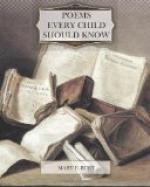Tell wit how much it wrangles
In tickle points
of nicenesse;
Tell wisdome she entangles
Herselfe in over-wisenesse;
And
if they do reply,
Straight
give them both the lye.
Tell physicke of her boldnesse;
Tell skill it
is pretension;
Tell charity of coldnesse;
Tell law it is
contention;
And
as they yield reply,
So
give them still the lye.
Tell fortune of her blindnesse;
Tell nature of
decay;
Tell friendship of unkindnesse;
Tell justice of
delay;
And
if they dare reply,
Then
give them all the lye.
Tell arts they have no soundnesse,
But vary by esteeming;
Tell schooles they want profoundnesse,
And stand too
much on seeming;
If
arts and schooles reply,
Give
arts and schooles the lye.
So, when thou hast, as I
Commanded thee,
done blabbing—
Although to give the lye
Deserves no less
than stabbing—
Yet
stab at thee who will,
No
stab the soule can kill.
SIR WALTER RALEIGH.
L’ENVOI.
“L’Envoi,” by Rudyard Kipling, is a favourite on account of its sweeping assertion of the individual’s right to self-development.
When Earth’s last picture
is painted, and the tubes are
twisted and dried,
When the oldest colours have faded, and the youngest
critic has died,
We shall rest, and, faith, we shall need it—lie
down
for an aeon or two,
Till the Master of All Good Workmen shall set
us to work anew!
And those who were good shall be
happy: they shall sit
in a golden chair;
They shall splash at a ten-league canvas with
brushes of comet’s hair;
They shall find real saints to draw from—Magdalene,
Peter, and Paul;
They shall work for an age at a sitting and never
be tired at all!
And only the Master shall praise us, and only the Master shall blame;
And no one shall work for money, and no one shall work for fame;
But each for the joy of the working, and each, in his separate star,
Shall draw the Thing as he sees It for the God of Things as They Are!
RUDYARD KIPLING
CONTENTMENT
“Contentment,” by Edward Dyer (1545-1607). This poem holds much to comfort and control people who are shut up to the joys of meditation—people to whom the world of activity is closed. To be independent of things material—this is the soul’s pleasure.
My mind to me a kingdom is;
Such perfect joy
therein I find
As far excels all earthly
bliss
That God or Nature
hath assigned;
Though much I want that most
would have,
Yet still my mind forbids
to crave.
Content I live; this is my
stay,—
I seek no more
than may suffice.
I press to bear no haughty
sway;
Look, what I lack
my mind supplies.
Lo, thus I triumph like a
king,
Content with that my mind
doth bring.




